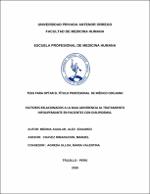Mostrar el registro sencillo del ítem
Factores relacionados a la baja adherencia al tratamiento hipolipemiante en pacientes con dislipidemia
| dc.contributor.advisor | Chavez Rimarachin, Manuel | |
| dc.contributor.author | Medina Aguilar, Alex Eduardo | |
| dc.creator | Medina Aguilar, Alex Eduardo | |
| dc.date.accessioned | 2020-03-05T16:18:31Z | |
| dc.date.available | 2020-03-05T16:18:31Z | |
| dc.date.issued | 2020 | |
| dc.identifier.uri | https://hdl.handle.net/20.500.12759/6064 | |
| dc.description.abstract | El propósito del estudio fue determinar si el conocimiento inadecuado sobre la enfermedad, polifarmacia, disfunción familiar, el sedentarismo y características sociodemográficas, son factores relacionados a la baja adherencia del tratamiento hipolipemiante en pacientes con dislipidemia en consultorios externos de medicina interna. Material y Métodos: Se realizó un estudio analítico, observacional, transversal, con un tamaño de muestra de 161 pacientes, que cumplieron con los criterios de selección. Para determinar la relación entre los factores y la adherencia al tratamiento se usó Odd Ratio de prevalecía (ORp) con su respectivo intervalo de confianza del 95%, además se corroboró la relación con el análisis bivariado de Chi Cuadrado de Pearson y análisis multivariado de regresión logística; la significancia estadística es del 5% (p < 0,05). Resultados: En el análisis bivariado, el conocimiento de la enfermedad [ORp 2,57(IC 95%: 1,26-5,23)] y disfunción familiar [ORp 41,42 (IC 95%:15,58-110,09)] constituyeron un factor asociados a baja adheerencia (p<0,05). Las variables polifarmacia [ORp 0.774 (IC 95%: 0.448-1.337)], procedencia [ORp 0.776 (IC 95%: 0.420-1.433)], no presentaron significancia estadística. Además, variable edad (p= 0.035), grado de instrucción (p= 0.04) y estado civil (p= 0.024) presentaron significancia estadística y se asocian a la baja adherencia. Con el análisis multivariado se evidenció también que salieron significativos para nuestro estudio, conocimiento de la enfermedad (p=0.027), [ORa 3.32 (IC 95%: 1.148-9.620)] y la disfunción familiar (p=0.00), [ORa 45.423 (IC 95%: 16.1312 127.899]. Conclusiones: La falta de conocimiento de la enfermedad y la disfunción familiar, son factores de asociados a la baja adherencia al tratamiento hipolipemiante, y dentro de las variables sociodemográficas la edad, estado civil y grado de instrucción se relacionan a esta baja adherencia | es_PE |
| dc.description.abstract | The purpose of the study was to determine whether inadequate knowledge about the disease, polypharmacy, family dysfunction, sedentary lifestyle and sociodemographic characteristics, are factors related to the low adherence of lipid lowering treatment in patients with dyslipidemia in external internal medicine offices. Material and methods: An analytical, observational, cross-sectional study was conducted with a sample size of 161 patients, who met the selection criteria. In addition, to determine the relationship between factors and adherence to treatment, ORp was used with its respective 95% confidence interval, and the relationship with Pearson's Chi-square bivariate analysis and multivariate logistic regression analysis were corroborated; The statistical significance is 5% (p <0.05). Results: When performing bivariate analysis, knowledge of the disease [ORp 2.57 (95% CI: 1.26-5.23)] and family dysfunction [ORp 41.42 (95% CI: 15.58-110.09) ] constituted a factor associated with low adhesion (p <0.05). The polypharmacy variables [ORp 0.774 (95% CI: 0.448-1.337)], provenance [ORp 0.776 (95% CI: 0.420-1.433)], did not show statistical significance. In addition, variable age (p = 0.035), degree of instruction (p = 0.04) and marital status (p = 0.024) presented statistical significance and are associated with low adherence. With the multivariate analysis it was also evidenced that they were significant for our study, knowledge of the disease (p = 0.027), [ORa 3.32 (95% CI: 1.148-9.620)] and family dysfunction (p = 0.00), [ORa 45.423 (95% CI: 16.1312 127.899]. Conclusions: Lack of knowledge of the disease and family dysfunction are factors associated with low adherence to lipid lowering treatment, and withi n the sociodemographic variables age, marital status and degree of instruction are related to this low adherence. | en_US |
| dc.description.uri | Tesis | es_PE |
| dc.format | application/pdf | es_PE |
| dc.language.iso | spa | es_PE |
| dc.publisher | Universidad Privada Antenor Orrego | es_PE |
| dc.relation.ispartofseries | T_MED.HUMA_2735 | |
| dc.rights | info:eu-repo/semantics/openAccess | es_PE |
| dc.rights.uri | https://creativecommons.org/licenses/by/4.0/ | es_PE |
| dc.source | Universidad Privada Antenor Orrego | es_PE |
| dc.source | Repositorio Institucional - UPAO | es_PE |
| dc.subject | Dislipidemia | es_PE |
| dc.subject | Adherencia a la medicación | es_PE |
| dc.title | Factores relacionados a la baja adherencia al tratamiento hipolipemiante en pacientes con dislipidemia | es_PE |
| dc.type | info:eu-repo/semantics/bachelorThesis | es_PE |
| thesis.degree.level | Título Profesional | es_PE |
| thesis.degree.grantor | Universidad Privada Antenor Orrego. Facultad de Medicina Humana | es_PE |
| thesis.degree.name | Médico Cirujano | es_PE |
| thesis.degree.discipline | Medicina Humana | es_PE |
| dc.subject.ocde | https://purl.org/pe-repo/ocde/ford#3.02.27 | es_PE |
| renati.type | https://purl.org/pe-repo/renati/type#tesis | es_PE |
| renati.level | https://purl.org/pe-repo/renati/level#tituloProfesional | es_PE |
| renati.discipline | 912016 | es_PE |
| dc.publisher.country | PE | es_PE |
Ficheros en el ítem
Este ítem aparece en la(s) siguiente(s) colección(es)
-
Medicina Humana [2969]


